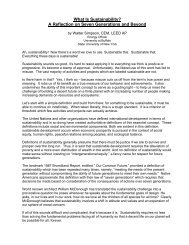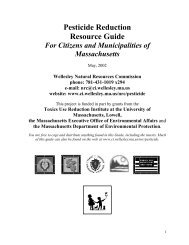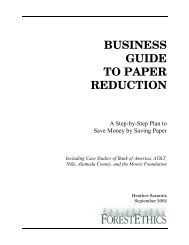Conference - Office of Sustainability - Tufts University
Conference - Office of Sustainability - Tufts University
Conference - Office of Sustainability - Tufts University
Create successful ePaper yourself
Turn your PDF publications into a flip-book with our unique Google optimized e-Paper software.
dictable levels it will no longer be possible to base future development and investments decisions<br />
on the past by using relevant historical environmental precedents. Climate change will<br />
also make ecosystems vulnerable and probably lead to unknown systemic changes in both rich<br />
and poor countries.<br />
The climate has experienced great “flips” in the past, which provide evidence that there may be<br />
a possibility for a “flip” in the future. 11,000 years ago the temperature dropped six to seven<br />
degrees and stayed that way for 1,500 years only to return to the original temperature in less<br />
than ten years. 5000 years ago the sea abruptly rose four meters in less than 140 years. When<br />
looking at climate science, the role <strong>of</strong> the ocean warming and historical precedent are also<br />
important.<br />
Unfortunately the debate portrayed in the media is inaccurate and does not reflect the dynamic<br />
process <strong>of</strong> science. Science is a work-in-progress where conclusions change over the long term<br />
so they cannot be portrayed as a “closed book.” We should avoid scientific debates in the media<br />
because <strong>of</strong> the tendencies to simplify issues, masking intricacies and overall accuracy.<br />
Summary by: Tomas Dinges<br />
EMISSION REDUCTION STRATEGIES<br />
Deborah Gordon, Yale <strong>University</strong> Transportation Project; Joe Romm, Center<br />
for Energy and Climate Solutions, author <strong>of</strong> Cool Companies<br />
Deborah Gordon, <strong>of</strong> the Yale <strong>University</strong> Transportation Project, discussed the important role<br />
which transportation plays in global climate change and highlighted a number <strong>of</strong> economic<br />
incentives and disincentives that governments could employ to bring about change.<br />
Economic incentives included:<br />
• “pay-as-you-drive insurance” which raises operating costs for vehicle owners<br />
who drive the most and imposes surcharges on poling auto mobiles like sport<br />
utility vehicles;<br />
• renewable fuels incentives in the form <strong>of</strong> tax credits;<br />
• “fee-bate” programs that impose a surcharge on vehicles that pollute the most<br />
while providing rebates to cleaner vehicles.<br />
Some disincentives discussed included:<br />
• gasoline taxes;<br />
• jet fuel taxes;<br />
• age indexed vehicle registration fees which would make owners <strong>of</strong> older, more<br />
polluting cars pay more.<br />
13







